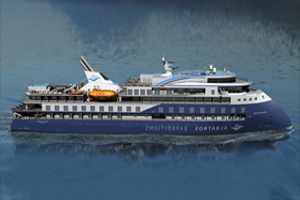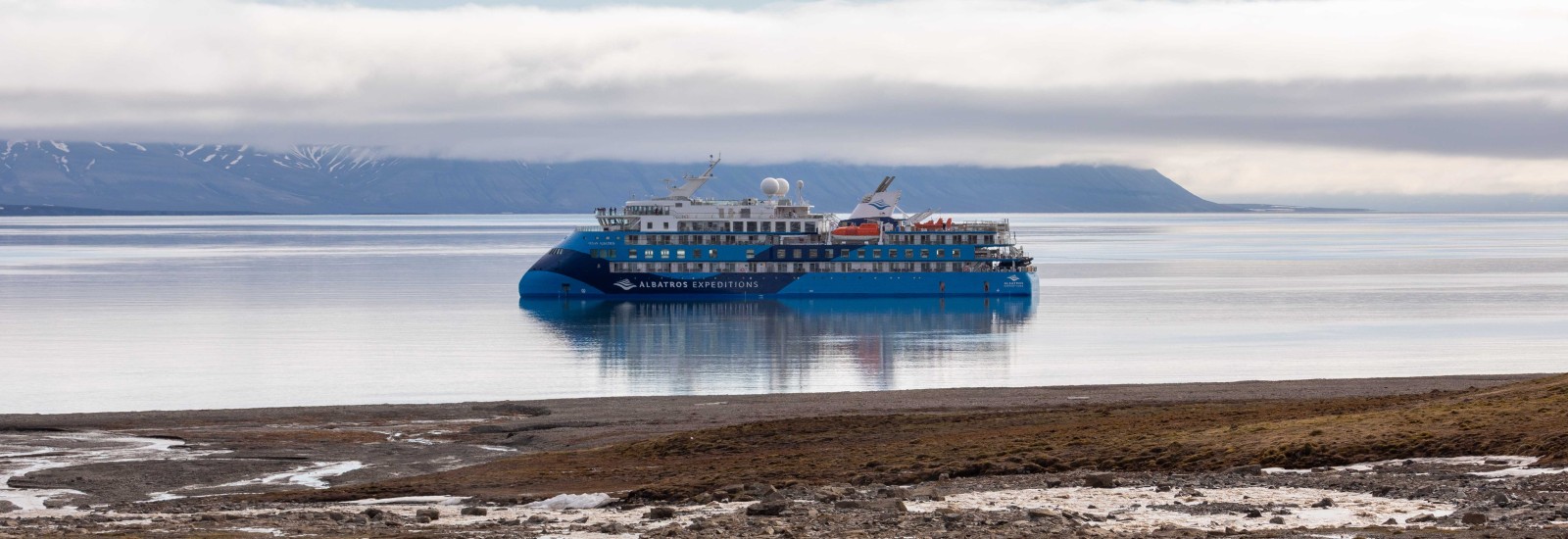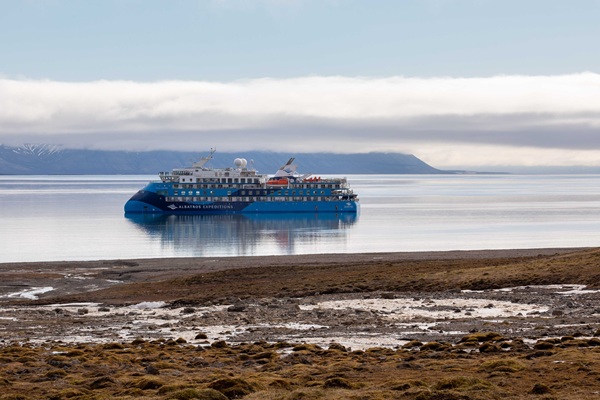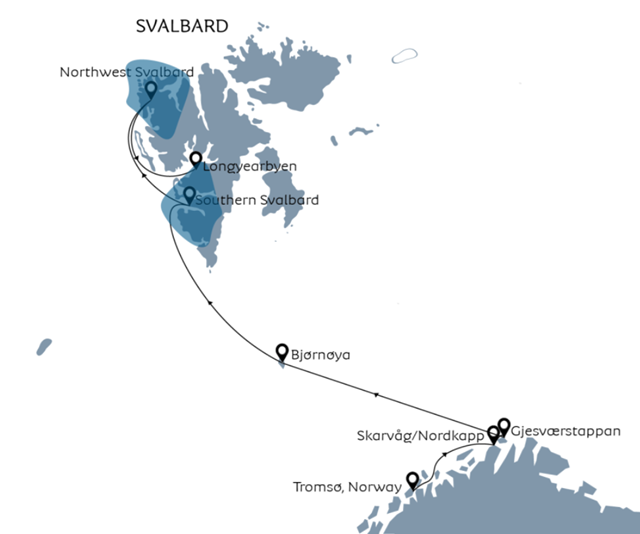DATES / RATES
|
| Start Date | End Date | From EUR | From USD |
|---|
| May 30, 2025 | Jun 06, 2025 | 4,677 |
5,321 |
// Rates are listed per person in USD
|
| Start Date | End Date | From EUR | From USD |
|---|
| May 30, 2025 | Jun 06, 2025 | 4,677 |
5,321 |
ITINERARY
Day 1 Tromsø, Norway -
Embarkation
Arrive in Tromsø, the majestic 'Capital of the Arctic'.
Situated deep in the maze of fjords for which Norway is famous,
Tromsø sits on an island surrounded by steep mountains and
plunging seas.
Known worldwide as Norway's Arctic capital, Tromsø is the
largest city in the European Arctic with around 80,000 residents, and
is the hub for transport, industry and tourism throughout the region.
Visitors from all ober the world come to experience this vibrant city,
as well as explore the stunning nature which surrounds it, or to simply
bask in the midnight summer sun.
Ocean Albatros awaits in the calm waters of the city harbour, ready to
take our guests on a spectacular journey, leaving Europe behind and
heading into the wild north beyond. After the mandatory safety drill,
relax on the outer decks sipping a carefully crafted cocktail as Ocean
Albatros sets sail through the fjords of northern Norway.
Day 2 Gjesværstappan,
Skarsvåg and the North Cape
In the early morning of the first full day of our expedition, we will
arrive at Gjesværstappan, a maze of rugged islands and
skerries off the coast of the small village of Gjesvær. These
islands were designated a nature reserve in 1983, and exploring on the
nearby waters cleary shows why! These islands hold an incredible amount
of life, with vast colonies of kittiwakes, guillemots, razorbills,
puffins and gannets all nesting in the area - one of Norway's greatest
natural wonders!
Ocean Albatros will reposition over lunchtime to the tiny village of
Skarsvåg. Skarsvåg holds the distinction of being
the most northerly fishing village in the world, and many residents
work harvesting the rich chilly waters at the top of Scandinavia. From
Skarsvåg, we will offer an optional excursion to Nordkapp,
the monument which marks the northernmost tip of mainland Norway and
the European continent (charge applies - see below for further details
on this excursion). This famed landmark beckons us to the next part of
our journey, as we leave civilisation behind in the evening, and strike
out towards the wild Arctic islands of Svalbard.
Day 3 Bjørnøya/Bear
Island
Situated in the middle of the Barents Sea between northern Norway and
southern Svalbard lies Bjønøya, known in English
as Bear Island. This rugged island marks the start of the High Arctic,
as the peaks of the island loom on the horizon.
Small, isolated and rarely visited, Bear Island was once heavily
exploited by whalers and sealers, who flocked to the island from across
Europe to harvest oil-bearing marine mammals. Thankfully, the island
and surrounding waters are now protected as a nature reserve, and the
island is returning to natural abundance. Despite the name, polar bears
are almost unknown here, but whales and seals are common in these rich
waters, and the steep cliffs of the isalnd are home to literally
millions of seabirds. Guillemots, razorbills, puffins and gannets all
crowd for space on tiny rock ledges, while hungry gulls and skuas
cruise overhead in a never-ending search for prey.
If conditions permit, we will aim to offer a Zodiac cruise with our
expert expedition team to experience the incredible wildife of this
remote island - a true bucket-list experience!
Day 4 Southwest Svalbard
The southwest coast of Svalbard is washed by warmer water coming up
through the Atlantic, so winter ice generally retreats first from this
reagion. This allows us to enter the southern fjords of the area, even
at the start of the summer - easily some of the most spectacular
regions of this stunning archipelago. Throughout this maze of fjords
and islands, birds cluster together on high cliffs and reindeer graze
on the fertile slopes below, while icebergs drift by from the various
large glaciers in the area. Tiny calico snow buntings flit between
crags, while perfectly camouflaged purple sandpipers scamper along the
shore. Look higher up on the vegetated slopes, and there - greyish
white 'boulders' move and resolve themselves into sheep-sized reindeer:
the unique subspecies native to Svalbard. A flash of bluish-black, and
the screeches of nearby birds herald the arrival of the Arctic fox, the
only native land predator on Svalbard (the polar bear being classified
as a marine mammal).
The mountaintops are most often covered by dense clouds and the
East-Spitsbergen current often leads pack ice into the mouths of the
fjords. With a huge variety of landing sites to explore, this region is
without doubt one of the most exciting and diverse regions of
Svallbard! Options to explore in the area include the huge bird cliffs
of Alkhjornet and Vårsolbukta, and the historical sites of
Calypsobyen and Bambsebu, where prospectors, trappers and a range of
other adventurers attempted to make their fortunes.
Days 5-7 Northwest Svalbard
One of the largest protected wilderness areas in Europe, North West
Svalbard was declared a national park in 1973. The area is famed for
its history, which documents some of the earliest human arrivals on
Svalbard. While Norse explorers may have sighted these icy shores
during the Viking Age, the first definite arrival was the expedition of
William Barents, the legendary Dutch explorer for whom the Barents Sea
is named. While now protected from human distruption, when Barents
arrived in 1596, he noted the vast numbers of whales and seals which
were soon prey to English and Dutch whalers, who arrived within a
decade of Barents to pillage the area's wildlife. The area occupies the
triple point between land, sea and ice, and as such was the perfect
location from which to harvest the gentle giants of the oceans. Sites
used to dismember whale carcasses and render them for their precious
oil include the Dutch settlement of Smeerenburg, where the remains of
16th Century blubber ovens and building foundations can still be seen.
Other sites such as nearby Ytre Norskøya record the darker
side of this industrialised slaughter, where hundreds of young men who
hoped to make their fortunes are buried thousands of miles from home.
Today, all that remains from this period of history are bones and the
scant remnants of human habitation. Slowly reclaimed by creeping Arctic
nature, the region is now a nature lovers paradise. Tiny Arctic poppies
and purple saxifrage defy the brutal conditions to flower in the brief
summer, while geese, eider ducks and other seabirds return to the
island to raise their young. Walrus can be found hauled out on beaches,
and we must always be on careful lookout for wandering polar bears in
this now again wild region.
A haven of wildlife, fascinating history and jaw-dropping scenery,
northwest Svalbard is surely one of the most spectacular areas of the
Arctic, if not the world!
Day 8 Longyearbyen, Svalbard -
Disembarkation
On the final morning of our expedition, we arrive in Longyearbyen,
Svalbard - the world's northernmost... everything! This remarkable
little city is not only the northernmost town in the world (if one
excludes the tiny research community of Ny-Ålesund, slightly
further north on Svalbard), but also hosts the world's northernmost
civilian airport, schools, bank and supermarket.
The town's rugged frontier edge belies a core of warm Nordic
hospitality and coziness, with comfy cafes, excellent restaurants and
boutique shops all within walking distance. Even this small town will
feel like a metropolis after days of isolation in the wilderness of the
Arctic!
After enjoying exploring Longyearbyen and a fond farewell to the crew
and fellow guests of Ocean Albatros, guest will be transported to
Svalbard Airport to flyy back to the Norwegian mainland- with memories
to last a lifetime.
Ocean Albatros (Luxury Expedition, 189-guests)
The Ocean Albatros, sistership to the Ocean Victory, will join the fleet of Albatros Expeditions in November 2022. The Ocean Albatros will be deployed to a large selection of expedition cruise destinations, Antarctica, the Arctic, any various exciting new destinations in between.
 (Click image to view Ship details)
(Click image to view Ship details)
WHAT'S INCLUDED
Inclusions
- 8-day/7-night cruise on Ocean Albatros in a shared outside
double room with a private bathroom in the category chosen
- Local transport in Longyearbyen on day 8
- English-speaking expedition staff
- Guided walks with the expedition team
- Nature hikes and Zodiac cruises per itinerary
- Information briefings and lectures by the expedition team
- Special photo workshop
- Full board on the ship
- Dinner drink package
- Free coffee, tea, and afternoon snacks on the ship
- Welcome and farewell cocktails
- Taxes, tariffs, and landing fees
- Digital visual journal link after the voyage, including
voyage log, gallery, species list, and more
Exclusions
- Extra excursions and activities not mentioned in the
itinerary
- Single room supplement and cabin upgrades
- Meals not on board the ship
- Beverages (other than coffee and tea and dinner-drink
package)
- Tips for the crew (we recommend USD 16 per person per day)
- Personal expenses
- Travel, cancellation, and senior insurance
- Anything not mentioned under
’Inclusions’
Kayaking Experience 345 USD p.p. To be booked and paid onboard. Please request more information about optional activities!







